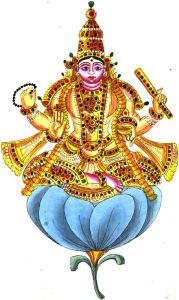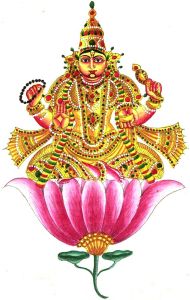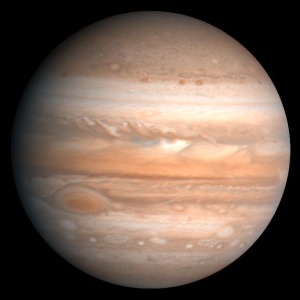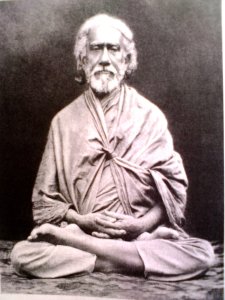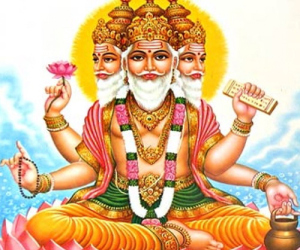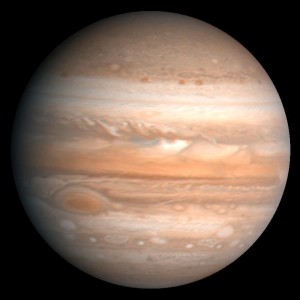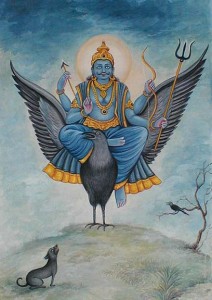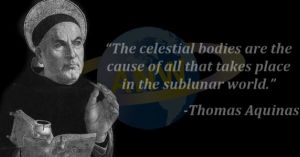 The old Jyotish texts of India clearly explain how the five elements (Sky, Wind, Fire, Water, and Earth) create all that is in existence in this world through the agency of the grahas, or the 9 planets of astrology as we call them in English. As an example, Venus represents the water element of nourishment, and so Venus represents good food, or the touch of a loved one, or a vehicle. All of these are things that help support us, nourish us, and make things more comfortable for us as we go down the path of our life. So the old books would relate the wife to Venus. This is a very simple example. The fun part is that many modern things now exist that were not around when our foundational texts were written, and so it is the task of the modern jyotishi to find out what planets and what elements will correlate to all the various people, places, and things in this world.
The old Jyotish texts of India clearly explain how the five elements (Sky, Wind, Fire, Water, and Earth) create all that is in existence in this world through the agency of the grahas, or the 9 planets of astrology as we call them in English. As an example, Venus represents the water element of nourishment, and so Venus represents good food, or the touch of a loved one, or a vehicle. All of these are things that help support us, nourish us, and make things more comfortable for us as we go down the path of our life. So the old books would relate the wife to Venus. This is a very simple example. The fun part is that many modern things now exist that were not around when our foundational texts were written, and so it is the task of the modern jyotishi to find out what planets and what elements will correlate to all the various people, places, and things in this world.
I imagine that if the shastras were written in a more modern time, they may have included different types of music and what planets they relate to. There are so many new and modern forms of music to have come about and most certainly would relate to the various planets and their admixtures.
First we must know that the Moon rules music overall. So the Moon rules all types of music. (The Moon makes one a musician as well, and the Sun makes one a singer and rules singing according to Jaimini.) But within that very very broad spectrum of all the types of music that exist, we can further divide them up by what planets would rule each branch of music, or each musical genre as they are called. And there will often be a lot of overlap, but some genres will stick out more as containing much more of a concentration of one planetary energy. Those are the main ones I included here. The more mixed musical genres I have mainly left out, but we can always remember that Mercury rules the mixed things. Here is what I have found so far:
SUN:
The Sun seems to rule any traditional nationalistic music that has no exportable appeal but is a part of national pride. The Sun also seems to rule spiritual, gospels, hymns, and bhajans. The Sun is the singer and Jaimini directly correlates this to singing the Vedas, and being “filled with inspiration.” So we can imagine that the Sun rules chanting the Vedas as well, and any sort of inspired spiritual singing such as Kirtan. Likely also Gregorian chants. I would also correlate the Sun to occapella music, as it is a very singular form of music, and it is only singing which we know to be the Sun. I also suspect Folk music to be under the umbrella of Surya as folk music is often sung by a singular person, and does not require a band like the Moon does. Also folk music is very nationally connected usually, and has a spiritual quality to it sometimes.
Moon:
Moon of course rules all music as said above, but particularly the Moon rules instrumental music. In particular, the Moon rules the masses, moving them as it moves the tides of the planet, and therefore the Moon would relate strongly to Pop music. Disco music is the Moon, a genre that is not very heavy or fearful, but dancy and uplifting and associated with the nightlife of the Moon. Perhaps that is why the shiny glittering white Lunar “disco ball” came to fit so naturally with disco. It was a trendy thing as well, just like the pop culture pull of the Moon’s energy.
Soundtracks of movies would of course be the Moon, as Moon relates strongly to movies and these are usually very instrumental to begin with.
Jazz music is also one I would relate to the Moon, as Jazz is very rhythm based and requires a very intimate connection between the bandmembers. The Moon rules musicians but not singers because musicians must be able to keep in rhythm with the rest of the band as the main skill. That is the Moons great quality and so to be a great Jazz musician really speaks to having a very strong Lunar side. Jazz is also instrumental most of the time. And it has a soft quality to it, but also a mysterious dark or void side of it. As we know when you listen to jazz you are supposed to listen to the “notes they arent playing” as Lisa Simpson would say. This is a lunar quality as well, since the Moon has two sides and one is a dark side we do not see, or hear in this sense.
Mars:
Mars would of course rule Rock n roll music, and most of its offspring. Some of them may have more Saturn mixed in, but we can definitely see Rock, Alternative Rock, Grunge, and Punk Rock being mainly martian. Metal could start to bridge into Saturn more as we shall see that Saturn rules very dark music. The funny thing about Mars ruling Rock music is that Rock music is admittedly mainly a genre that was “stolen” from the black blues musicians of the southern United States. They simply took it and sped up the tempo and added more drums to it and other things and it became what we now know. Take the early Led Zeppelin and Rolling Stones albums as key examples of this transformation. I note this because Mars rules theives, and stealing, whether for a good or bad reason. So it is interesting that even Mick Jagger and many other pioneers of it have admitted that it was highly influenced or possibly somewhat stolen from blues musicians.
Mercury:
Mercury, being the one most fond of and skilled at wordplay, would of course rule over Hip Hop. Other highly lyrical or verbal based music that doesnt come under the Sun’s influence may also fall under Mercury. Mercury would of course rule comedic music too, and parody music like Weird Al Yankovich. Mercury also seems to rule over electronic music. It is interesting how the most deep thinking planet Jupiter is starved by Mercury, and Hip Hop as a genre seems to have a harder time getting out of a superficial place and having more meaningful content. Having a message other than how great the rapper is doesnt seem to be as important for a song to be successful in this genre, and there may be an archetypal reason for this. Of course there is a lot of very meaninful hip hop out there as well, to be sure. But in general we can see how Jupiter gets a bit starved in this genre more than others. But Venus, as the great friend of Mercury, seems to do well (wink).
Jupiter:
Jupiter is the planet that rules the Ether element. Or the “Akash”, which is a sanskrit word that means “sky”. The Akash chakra, as many of you will know, is the throat chakra, related to Sound. Vibration and sound is very close to Jupiter. As such, Jupiter seems to rule any kind of musical sound, not a particular type of style, but more about the power and meaning behind the music. So Jupiter relates to deep and soulful music that stirs the depths of our beings. This is not limited to just one genre. He can relate to any philosophical music or any music with a real message and purpose behind it. He therefore represents devotional chants and mantra music and will share some overlap with the Sun in this regard. Mantra and Naada Yoga music, sitars and ragas are very Jupiterian.
Soul is a genre that has the qualities of Jupiter embedded in it. One thing is that Jupiter is not as likely to sing as the Sun is. So music similar to the Sun’s category, but with less lyrics and more room for contemplation would be under Guru’s domain.
He also seems to have a say on culturally rich music, similar to the Sun. Though not with a national appeal but a cultural appeal. Music that is simple and yet powerful and uplifting is Jupiterian. So in this regard Folk can connect to Jupiter, as it is a simple music that any common folk person can make, but often has no value without an equal amount of soul and truth behind the lyrics. Classical music of Bach, Beethoven, and that sort are also a category that is predominantly Jupiterian. Reggae may also be Jupiterian, as it is so initimately connected with the Rastafarian religion.
Venus:
Venus is the main planet of entertainment, and so music that is made primarily for entertainment purposes is Venusian music. And music designed for dance and sexual appeal. So Venus therefore rules almost all of the modern popular music being made nowadays. Venus can rule dance, R & B, Calypso, Flamenco, Funk, Ska, and Latin music to name a few. And of course any beautiful music with wonderful harmony would be of the Venusian vibration. Music that makes you want to get up and dance is Venus.
Saturn:
Saturn is the planet of sorrow. Therefore the main category that is most Saturnian to me is the blues. Saturn also is closely connected to the color blue, interestingly enough. Blues is just Saturn through and through, I dont think anyone will debate that. It also was born out of the struggling black culture of the United States in the last 100 years. Saturn is the one who makes great things come out of great sufferring.
Of course all dark music genres will mainly have the influence of Shani, so Metal and “Doom metal” (whatever that is) and all those sorts of things are likely falling under Saturns umbrella, though I actually havent listened to most of these genres myself. I am just gonna assume they are as dark as they sound. Saturn would also relate to very old music as well, and especially if it doesnt fit into any of the previously mentioned categories.
Rahu/Ketu:
Rahu and Ketu dont rule any particular genre but Rahu will make any genre more technologically centered, and more innovative. It will be less acoustic and natural sounding and more electronic and overly produced. More avant-garde. Most of the garbage pop music you hear nowadays would be a mixture of Moon and Rahu, an unpleasant combination. (That is actually a placement that gets people involved or interested in hypnotism amongst other things. And it is interesting how there has been enormous amounts of money invested in researching what type of ways to make pop music get stuck in peoples heads more easily, therefore making them want to buy that song or that album more. It seems to have an unpleasantly hypnotic quality to it. When you are in the grocery store you can hear 30 seconds of one of those songs and it can be in your head for hours after.)
Ketu would do the opposite and make one’s music more introverted, more myopic, more acoustic and “raw” and underproduced. Often times when a musician first puts out an album, before he is famous, this album is often underproduced and more raw sounding, and this is usually the person’s best album because it is their most Ketu album. It is there most heartfelt and sincere album. Then of course they get famous and Rahu muddies up their inner vision and they cannot seem to get back to that previous sound no matter how nice of a guitar they have now…That is one way we can see the Rahu and Ketu influence on music and musicians.
Conclusion:
The Grahas put their mark on all things in this world, we only need to be perceptive enough to see it. Music and its many genres are no exception. This is all from my own insights and observations and I may adjust these over time. This is only what I have found to be true so far.
